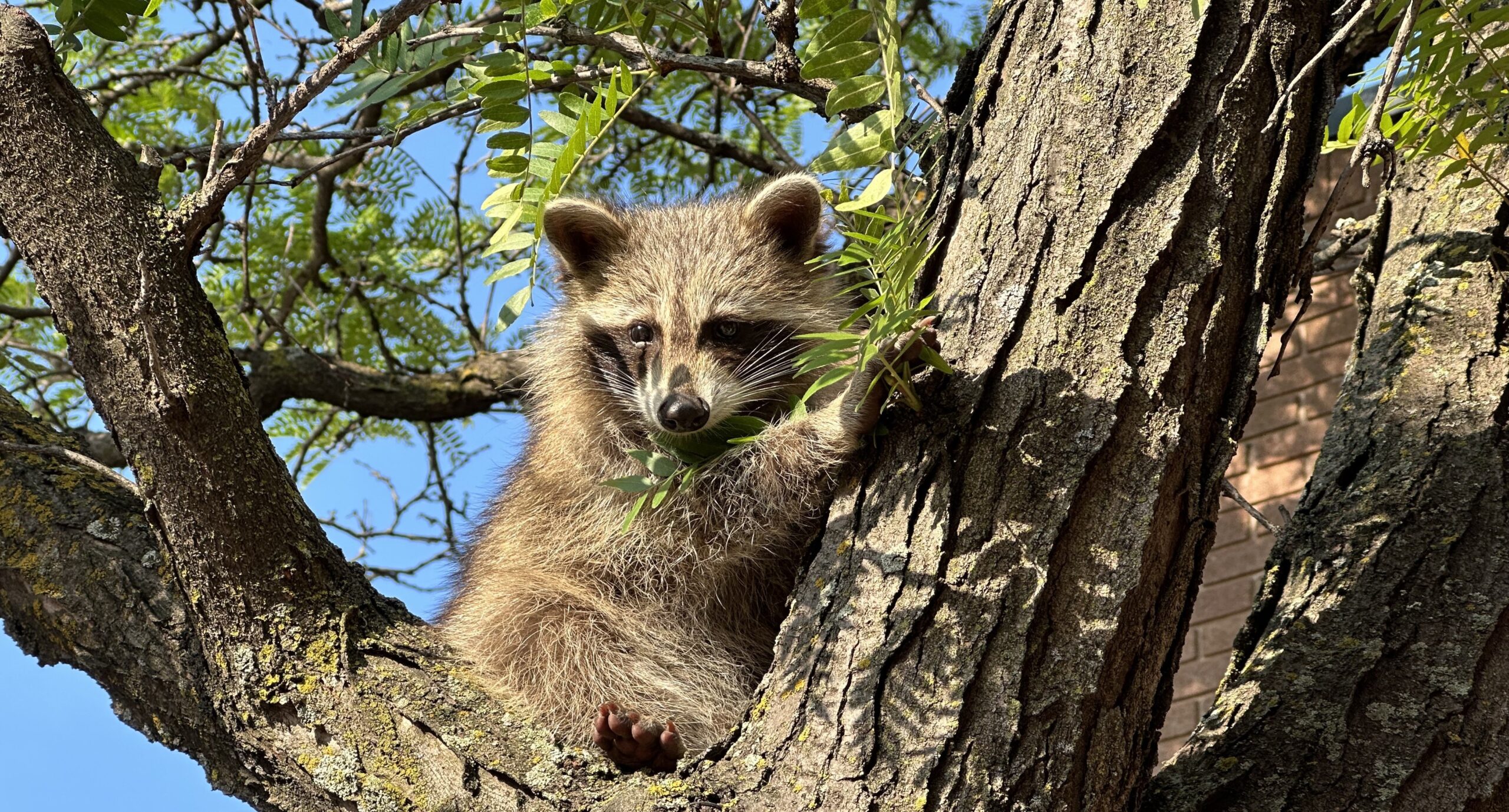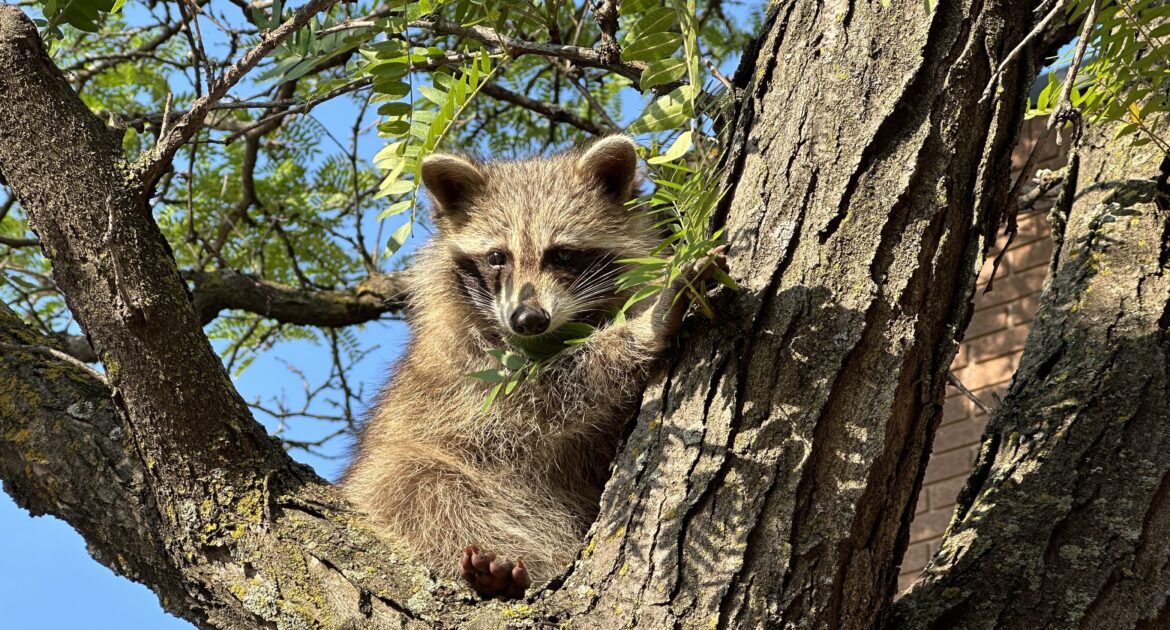Raccoons can be a common sight for homeowners, whether they’re curiously investigating trash cans or wandering through backyards. But when questions about safety arise, particularly “are raccoons aggressive?” it’s natural to feel concerned. While these animals are typically shy and avoid direct confrontation, under certain circumstances, they can display aggressive behavior. If you’re wondering how to handle raccoon encounters safely and responsibly, we’ve got all the answers right here.
Below, we’ll explore whether these adaptable animals are naturally aggressive, provide actionable advice on dealing with aggressive raccoons, and offer tips to minimize the risks of encounters right in your backyard. Our team at Skedaddle Humane Wildlife Control in Denver is here to help you better understand these fascinating creatures while keeping you and your family safe from potential threats in neighborhoods like Conifer.
Are Raccoons Aggressive?
Most raccoons are not naturally aggressive and prefer to avoid humans altogether. However, their behavior can shift depending on specific situations. For example, a raccoon that feels threatened, cornered, or is simply trying to protect its young might display defensive or intimidating behavior.
Some signs of aggression include growling, hissing, shrieking, and fluffing up their fur to appear larger. It’s important to remember that these warning signs are often their way of asking for space, rather than outright hostility. That said, any wild animal, including raccoons, can act unpredictably when they feel threatened.
The biggest concern with aggressive raccoons stems from their potential to carry diseases such as rabies. While cases of rabid raccoons are rare, it’s critical to avoid direct contact with any raccoon exhibiting signs of unusual behavior, such as:
- Daytime activity (raccoons are usually nocturnal);
- Foaming at the mouth;
- Difficulty walking or poor coordination;
- Unprovoked aggression without being approached.
If you notice any of these behaviors, we recommend staying at a safe distance and contacting wildlife control professionals who can assess and address the situation. Keeping yourself, your family, and your pets safe should always be the priority.
How To Handle Raccoon Encounters
Encountering a raccoon on your property isn’t uncommon, especially in areas like Denver’s neighborhoods where green spaces meet urban living. Whether it’s a casual encounter or a more unsettling one with an aggressive raccoon, here’s how you can handle the situation safely and effectively.
- Keep Your Distance: Raccoons may seem curious or harmless, but you should never approach them. Maintain a safe distance and observe from afar.
- Do Not Feed or Attract Them: Intentionally feeding raccoons can encourage unsafe interactions and increase the likelihood of them returning to your property. Secure trash cans with bungee cords or raccoon-proof locks and keep pet food indoors.
- Avoid Startling Them: If you encounter a raccoon unexpectedly, avoid making sudden movements or loud noises that may startle it. Instead, slowly and calmly back away.
- Give Them an Escape Route: Raccoons tend to flee when given the chance. If they’re inside a structure like an open garage, leave a clear exit path and step back to allow them to leave on their own.
- Carefully Monitor Pets: Keep your pets indoors or on a leash in areas where raccoon activity is high. If pets and raccoons meet, it can lead to defensive behavior from the animal.
- Call Wildlife Control for Assistance: If the raccoon shows no signs of leaving, appears injured, or is behaving aggressively, it’s best to contact professionals like our Skedaddle team. Our approach ensures that interactions are handled humanely and effectively to minimize stress for both humans and wildlife.
By following these steps, you can reduce the risks associated with raccoon encounters. Most of the time, these curious visitors will go about their day peacefully if left undisturbed.
Dealing With Aggressive Raccoons In Conifer
On rare occasions, you may encounter a raccoon that displays immediate aggression. If this happens, your safety must be the top priority. Here’s how to react in such situations:
- Don’t Engage or Confront
Avoid making direct eye contact or cornering the animal. Give it ample space to retreat.
- Stay Calm
Panicking or screaming can escalate the situation. Use deliberate and slow movements to distance yourself from the raccoon.
- Keep Barriers Between You and the Raccoon
If possible, place a physical barrier, such as a door or solid object, between you and the raccoon.
- Protect Your Pets
Immediately bring pets indoors. An agitated raccoon can present a danger to animals left outside.
- Seek Professional Help Immediately
If the raccoon won’t retreat or poses an immediate threat, call wildlife control specialists without delay. Attempting to handle the situation yourself can be both dangerous and ineffective.
Raccoons rarely lash out without reason, but knowing how to handle aggressive individuals will ensure you’re prepared for the worst-case scenario.
Preventing Raccoon Problems In Denver
Preventing raccoons from becoming regular visitors to your property is one of the most effective ways to avoid potential issues. Here’s what we recommend to homeowners in the Denver area and beyond:
- Secure Food Sources
Raccoons are opportunistic feeders. Seal trash lids tightly, remove bird feeders, and avoid leaving pet food outdoors.
- Block Entry Points
Inspect your home for vulnerabilities like loose roof vents, damaged soffits, or holes. Raccoons can squeeze through surprisingly small gaps.
- Install Motion-Sensing Lights
Bright lights can deter raccoons from hanging around your yard. Consider installing motion-sensing lights around areas like trash cans or garages.
- Eliminate Shelter Opportunities
Raccoons often shelter under porches or in sheds. Block access to these areas by ensuring they’re sealed off properly.
- Schedule a Professional Home Assessment
Wildlife control teams like ours offer home assessments to identify vulnerabilities and recommend steps for fortification.
Preventative measures won’t just keep your property raccoon-free; they’ll create a safer environment for you, your family, and your pets.
We also encourage homeowners to be mindful of seasonal behavior. For example, during spring in Denver, raccoons may seek quiet spaces in attics or chimneys to raise their young. Acting early is key to avoiding costly disruptions later.
When to Call for Professional Raccoon Removal
Knowing when to call professional raccoon removal services can save time, money, and stress. If you notice signs such as unusual noises in your attic, chew marks on wires or insulation, or overturned garbage bins, it’s time to act.
- Raccoons can carry diseases like rabies and parasites, posing health risks to your household.
- They can cause significant structural damage if not addressed promptly.
- Seeing a raccoon during the day may indicate illness or aggression and should be addressed immediately.
Professionals are equipped with the tools and expertise to address the problem safely and humanely, ensuring your home remains secure while adhering to local wildlife protection regulations.
Make Your Home Raccoon-Free
Raccoons are captivating creatures, but their presence on your property can sometimes lead to challenging situations. By understanding their behavior, knowing how to handle raccoon encounters, and taking preventative action, you can maintain a safe and peaceful coexistence with the wildlife in your community.
If you’re dealing with an aggressive raccoon or just want to ensure your home is as secure as possible, we’re here to help. Skedaddle’s experienced team specializes in humane wildlife control, offering expert advice and practical solutions for homeowners across cities like Denver.
Call us today to schedule a consultation and take the first step towards a raccoon-free home.




